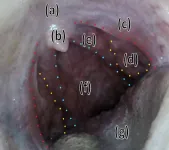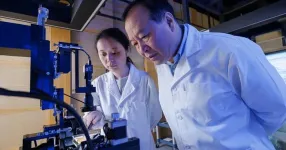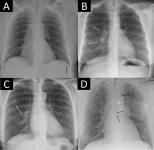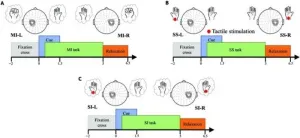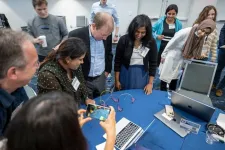(Press-News.org) The American Society for Biochemistry and Molecular Biology announced today the winners of its annual awards. Colleagues and other leaders in the field nominated the winners for making significant contributions to biochemistry and molecular biology as well as to the training and support of emerging scientists.
The recipients will give talks about their work at the society’s 2025 annual meeting slated for April 12–15 in Chicago.
In addition to cash prizes ranging from $2,000 to $35,000, each awardee will receive a plaque and transportation expenses to the annual meeting.
Learn more about the ASBMB awards.
Herbert Tabor Research Award
Given for outstanding, innovative accomplishments in biological chemistry and molecular biology and contributions to the community of scientists.
Joseph Schlessinger is a professor of pharmacology at Yale University School of Medicine. His lab explores the mechanism of activation of receptor tyrosine kinase and their signaling pathways during homeostasis as well as in cancer and other diseases. His research provided the conceptual foundation for targeted cancer therapies, including drugs developed by his biotech companies. He is a member of the National Academy of Sciences, the National Academy of Medicine and the American Academy of Arts and Sciences. His talk will be titled “Cell signaling by receptor tyrosine kinases: From basic principles to cancer and other therapies.”
Walter A. Shaw Young Investigator Award in Lipid Research
Recognizes outstanding research contributions in the area of lipids by a young investigator.
Robert N. Helsley is an assistant professor of medicine at the University of Kentucky College of Medicine. His lab focuses on the mechanisms underlying obesity, chronic liver disease and atherosclerosis. In 2024, he was named a junior associate editor for ASBMB’s Journal of Lipid Research. His talk will be titled “The contribution of fatty acid oxidation to diet-induced hepatocellular carcinoma.”
ASBMB Emerging Leadership Award
Honors an individual who is an associate professor, assistant professor or equivalent and with no more than 15 years of experience since receiving a Ph.D. and/or M.D.
Nicole C. Woitowich is a research assistant professor of medicine in the department of medical social sciences at Northwestern University and the executive director of the school’s Clinical and Translational Sciences Institute. Her research investigates the intersections of sex and gender in biomedicine, from research policy to practice, emphasizing the importance of considering sex as a biological variable and the inclusion of women in the biomedical research workforce. She chaired the ASBMB Science Outreach and Communication Committee from 2019 to 2022. Woitowich will give special remarks at the Women’s Networking Dinner.
Earl and Thressa Stadtman Young Scholar Award
Awarded to a scientist with no more than 15 years of experience since receiving a Ph.D. and/or M.D.
Vincent Tagliabracci is an associate professor of molecular biology and the Michael L. Rosenberg Scholar in Medical Research at the University of Texas Southwestern Medical Center. His lab has discovered diverse and unexpected biochemical activities performed by protein kinases, including AMPylation, polyglutamylation and messenger RNA capping. These discoveries have provided new insights into the cellular response to oxidative stress and the pathogenic mechanisms used by bacterial and viral pathogens. Tagliabracci won the Norman Hackerman Award in Chemical Research and the Edith and Peter O’Donnell Award in Biological Sciences. In 2021, he was named a Howard Hughes Medical Institute investigator. His talk will be titled “Expanding the kinome.”
Bert and Natalie Vallee Award in Biomedical Science
Awarded to an established scientist for outstanding accomplishments in basic biomedical research.
Andre Nussenzweig is a National Institutes of Health distinguished investigator at the Center for Cancer Research, National Cancer Institute of the NIH. His research examines genome stability as well as DNA repair pathways and their roles in cancer prevention. He has won many awards including the Basser Global Prize, the Environmental Mutagenesis and Genomics Society Professional Award and the Health and Human Services Career Achievement Award. Nussenzweig is a member of the European Molecular Biology Organization, the National Academy of Medicine, the National Academy of Sciences and the American Academy of Arts & Sciences. His talk will be titled “Maintaining genome stability.”
Avanti Award in Lipids
Recognizes outstanding research contributions in the area of lipids.
Judith Storch is a professor of nutritional sciences in the School of Environmental and Biological Sciences at Rutgers University. Her lab studies lipid traffic in cells, with particular emphasis on the proteins that bind long-chain fatty acids, monoacylglycerols and cholesterol. Storch has served on ASBMB’s Journal of Biological Chemistry editorial board and the ASBMB Publications Committee. She is on the steering committee of the ASBMB Lipid Research Division. Storch is a fellow of ASBMB and the American Society for Nutrition. Her talk will be titled “Functional analysis of intracellular lipid-binding proteins.”
ASBMB William C. Rose Award for Exemplary Contributions to Education
Recognizes an individual who demonstrates an exceptional contribution to the teaching of biochemistry and molecular biology.
Neena Grover is a professor of chemistry and biochemistry at Colorado College. Her lab studies the role of sequence on small RNA motif stability. They are particularly interested in the interactions between RNA and metal ions. Grover is a founding member of the ASBMB Undergraduate Student Chapters program and serves as the adviser for the K-12 science outreach program at her institution. She is also a former member of the ASBMB steering committee that designed, created and developed course materials and assessment tools to teach the core concepts in biochemistry and molecular biology effectively and consistently. In addition, she has organized workshops and interest groups at the ASBMB annual meetings focused on education and research at primarily undergraduate institutions. Her talk will be titled “Embracing collaborations: Loving what we do and doing what we love.”
ASBMB Ruth Kirschstein Diversity in Science Award
Honors an outstanding scientist who has shown a sustained commitment to breaking down local and/or systemic barriers against scientists and students from historically marginalized or excluded groups.
Benjamin A. Garcia is a professor and the head of biochemistry and molecular biophysics at the Washington University School of Medicine in St. Louis. His lab uses quantitative mass spectrometry–based proteomics to characterize modified proteins and proteomes, especially those involved in epigenetic mechanisms. Garcia serves on the editorial board of the ASBMB journal Molecular & Cellular Proteomics. In 2020, he won the Human Proteome Organization’s Discovery in Proteomics Sciences Award for developing mass spectrometry–based experimental and computational platforms for characterizing histone posttranslational modifications. His talk will be titled “An unlikely career in science and academia.”
ASBMB DeLano Award for Computational Biosciences
Given to a scientist for accessible and innovative developments or applications of computation to enhance research in the life sciences at the molecular or cellular level.
Rohit V. Pappu is a professor of biomedical engineering and the director for the Center for Biomolecular Condensates at Washington University in St. Louis. The Pappu lab explores the biophysical principles underlying the form, function and phase behaviors of intrinsically disordered and multivalent proteins and connects these to understand how cellular matter is organized in space and time. Pappu is a fellow of the Biophysical Society, the American Association for the Advancement of Science and a Mercator fellow of the German Research Foundation. His talk will be titled “Phase separation in cells: Insights from biophysical computations.”
Alice & C.C. Wang Award in Molecular Parasitology
Recognizes established investigators who are making seminal contributions to the field of molecular parasitology.
David A. Fidock is a professor of microbiology and immunology and medical sciences at Columbia University. His lab investigates the life cycle and pathogenesis of the malaria parasite Plasmodium falciparum. Specifically, he is interested in elucidating the molecular and genetic basis of how P. falciparum acquires resistance to antimalarial drugs and how parasite biology can inform the discovery and development of new candidate drugs. Fidock is the incoming President of the American Society of Tropical Medicine. Earlier, he won the society’s Bailey K. Ashford Medal and Trager Award in Molecular Parasitology. He is also a member of the Malaria Policy Advisory Group for the World Health Global Malaria Program. He was named Australian of the Year in Life Sciences in 2016 and was awarded the Project of the Year from the Medicines for Malaria Venture in 2020. His talk will be titled “Molecular insights into antimalarial drug resistance.”
END
ASBMB honors 10 scientists for scientific and community contributions
They’ll give award lectures at the society's annual meeting in April in Chicago
2024-08-20
ELSE PRESS RELEASES FROM THIS DATE:
Using low-cost videoscopes to obtain accurate video “oral selfies” as screening for hpv-associated oropharyngeal cancer: a new screening technology?
2024-08-20
The rise in the incidence of oropharyngeal squamous cell carcinomas (OPSCCs) linked to human papillomavirus (HPV)-16 infection has become notable, surpassing cervical high-risk HPV infections by 2019. HPV-associated OPSCCs present a better prognosis compared to traditional oropharyngeal malignancies, largely due to lower correlations with chronic tobacco and alcohol use. Despite the sexually transmitted nature of HPV-associated OPSCCs, data on sexual behaviors is sparse in cancer registries, complicating correlation studies. Notably, high-risk factors in men include recent ...
PolyU scientists harness quantum microprocessor chips for revolutionary molecular spectroscopy simulation
2024-08-20
Quantum simulation enables scientists to simulate and study complex systems that are challenging or even impossible using classical computers across various fields, including financial modelling, cybersecurity, pharmaceutical discoveries, AI and machine learning. For instance, exploring molecular vibronic spectra is critical in understanding the molecular properties in molecular design and analysis. However, it remains a long-standing computationally difficult problem that cannot be efficiently solved using traditional super-computers. Researchers are diligently working on quantum computers and algorithms to ...
Black Americans at greater Alzheimer’s risk and treatment burden, less awareness of disease and symptoms
2024-08-20
INDIANAPOLIS – A new study examining older Black Americans’ perceptions of Alzheimer’s disease has found a lack of awareness of the devastating condition. The authors propose strategies for supporting brain health in this population.
Absence of awareness of Alzheimer's disease may undermine Black Americans’ ability to identify potential risk of the disease and its impact on their community, said Johanne Eliacin, PhD, Regenstrief Institute, U.S. Department of Veterans Affairs and the Indiana University School of Medicine research scientist and study leader. ...
AI can help rule out abnormal pathology on chest x-rays
2024-08-20
OAK BROOK, Ill. – A commercial artificial intelligence (AI) tool used off-label was effective at excluding pathology and had equal or lower rates of critical misses on chest X-ray than radiologists, according to a study published today in Radiology, a journal of the Radiological Society of North America (RSNA).
Recent developments in AI have sparked a growing interest in computer-assisted diagnosis, partly motivated by the increasing workload faced by radiology departments, the global shortage of radiologists and the potential for burnout in the field. Radiology practices have a high volume of unremarkable ...
Recent developments of vaccines as a precision medicine approach to cancer immunotherapy
2024-08-20
The field of precision medicine, especially in the context of cancer immunotherapy, has seen significant advancements in recent years. Precision medicine tailors treatment to the unique genetic and molecular profile of each patient, moving away from conventional one-size-fits-all approaches. This personalized strategy aims to minimize side effects and maximize therapeutic efficacy. A key component of this approach is the use of immune checkpoint inhibitors (ICIs), monoclonal antibodies that target immunosuppressive molecules such as PD-1, PD-L1, and CTLA-4. These ICIs have demonstrated considerable ...
Enhancing brain-computer interface performance through tactile and motor imagery: A revolutionary EEG study
2024-08-20
In a groundbreaking study recently published, researchers from Zhejiang University have unveiled significant findings that could enhance brain-computer interface (BCI) technologies, marking a crucial step towards more intuitive neuroprosthetic control and advanced rehabilitation therapies. The study, titled "Neural Correlates of Motor/Tactile Imagery and Tactile Sensation in a BCI paradigm: A High-Density EEG Source Imaging Study," employed high-density electroencephalogram (EEG) recordings to delve into the neural dynamics of motor and ...
Inhaler misuse leads to mismanagement of COPD symptoms, increased exacerbations
2024-08-20
MIAMI (August 20, 2024) – Inhaler misuse leading to inadequate medication delivery impacts a person’s ability to manage symptoms of chronic obstructive pulmonary disease (COPD), and additional education about proper inhaler use is needed to improve health outcomes, according to two new articles. The articles are published in the July 2024 issue of Chronic Obstructive Pulmonary Diseases: Journal of the COPD Foundation, a peer-reviewed, open-access journal.
COPD comprises several conditions, including chronic bronchitis and emphysema, and can be caused by irritants like smoke or pollution and genetics. The disease affects more than 30 ...
Growth from adversity: How older adults bounced back from the COVID-19 pandemic
2024-08-20
During a pandemic, attention is usually focused on the immediate challenges, such as managing the disease, ensuring safety and coping with disruptions in daily routines. Adversity, while difficult, can sometimes lead to positive effects.
For older adults living in retirement communities, there has been limited research on how the COVID-19 pandemic and its regulatory measures affected them. Additionally, there is scant research on any potential positive effects for this population.
Now, a new study of 98 older adults (median age 86 years) living in a continuing care retirement community in South Florida during COVID-19 reveals ...
The University of Texas at San Antonio tackles research security threats with $67 million NSF grant
2024-08-20
UTSA will partner with Texas A&M University to co-lead SECURE Southwest, one of five new regional centers being launched to strengthen U.S. research security.
Under a five-year, $67 million award from the National Science Foundation (NSF), the Safeguarding the Entire Community of the U.S. Research Ecosystem (SECURE) Center aims to strengthen intellectual property and research security by educating members of the research community about security issues and engaging them in a process of collaborative problem-solving.
The ...
Computer scientists discover vulnerabilities in a popular security protocol
2024-08-20
A widely used security protocol that dates back to the days of dial-up Internet has vulnerabilities that could expose large numbers of networked devices to an attack and allow an attacker to gain control of traffic on an organization's network.
A research team led by University of California San Diego computer scientists investigated the Remote Authentication Dial-In User Service (RADIUS) protocol and found a vulnerability they call Blast-RADIUS that has been present for decades. RADIUS, designed in 1991, allows networked devices such as routers, switches or mobile roaming gear to use a remote server to validate login or other credentials.
This is a common set-up in enterprise and ...
LAST 30 PRESS RELEASES:
Scientists discover why we know when to stop scratching an itch
A hidden reason inner ear cells die – and what it means for preventing hearing loss
Researchers discover how tuberculosis bacteria use a “stealth” mechanism to evade the immune system
New microscopy technique lets scientists see cells in unprecedented detail and color
Sometimes less is more: Scientists rethink how to pack medicine into tiny delivery capsules
Scientists build low-cost microscope to study living cells in zero gravity
The Biophysical Journal names Denis V. Titov the 2025 Paper of the Year-Early Career Investigator awardee
Scientists show how your body senses cold—and why menthol feels cool
Scientists deliver new molecule for getting DNA into cells
Study reveals insights about brain regions linked to OCD, informing potential treatments
Does ocean saltiness influence El Niño?
2026 Young Investigators: ONR celebrates new talent tackling warfighter challenges
Genetics help explain who gets the ‘telltale tingle’ from music, art and literature
Many Americans misunderstand medical aid in dying laws
Researchers publish landmark infectious disease study in ‘Science’
New NSF award supports innovative role-playing game approach to strengthening research security in academia
Kumar named to ACMA Emerging Leaders Program for 2026
AI language models could transform aquatic environmental risk assessment
New isotope tools reveal hidden pathways reshaping the global nitrogen cycle
Study reveals how antibiotic structure controls removal from water using biochar
Why chronic pain lasts longer in women: Immune cells offer clues
Toxic exposure creates epigenetic disease risk over 20 generations
More time spent on social media linked to steroid use intentions among boys and men
New study suggests a “kick it while it’s down” approach to cancer treatment could improve cure rates
Milken Institute, Ann Theodore Foundation launch new grant to support clinical trial for potential sarcoidosis treatment
New strategies boost effectiveness of CAR-NK therapy against cancer
Study: Adolescent cannabis use linked to doubling risk of psychotic and bipolar disorders
Invisible harms: drug-related deaths spike after hurricanes and tropical storms
Adolescent cannabis use and risk of psychotic, bipolar, depressive, and anxiety disorders
Anxiety, depression, and care barriers in adults with intellectual and developmental disabilities
[Press-News.org] ASBMB honors 10 scientists for scientific and community contributionsThey’ll give award lectures at the society's annual meeting in April in Chicago
